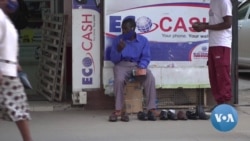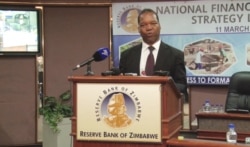With no end of cash shortages in sight in Zimbabwe, the use of mobile money has become the order of the day in the southern African nation. The central bank says it is happy with the situation and wants 90% of all transactions to be electronic.
For years now, Zimbabwe has faced an acute shortage of cash. That has forced people to switch to mobile money.
An informal sector is booming in the electronic exchange of foreign currency for the local currency, or in some cases, the other way around. This is called RTGS, or real-time gross settlement.
“Generally — the bondnotes — most people are not accepting them because they are losing value. So people do not want them," explains informal trader Slyvester Mupfururi. "So people prefer using the RTGS for easy movement of doing their business. So that’s why they are preferring the local currency in RTGS form. Also it has better margin when they get it from the streets because we are offering 101 whilst the auction rate of the government is offered at 82-point something, 83-point something.”
The process is profitable for traders, and some people have left their formal jobs such as teaching for it.
But it’s a hustle which is technically criminal. That’s why some traders do not want to identified such as this man.
"Zimbabwe’s currency is worthless," he says. "That’s why people — even those formally employed — come to us in the streets looking for foreign currency. That’s how we survive.”
In a statement to VOA, John Panonetsa Mangudya, governor of the Reserve Bank of Zimbabwe, said he was happy with the current trend in which around 80% of the country’s transactions are conducted electronically.
“Our goal is to see Zimbabwe becoming a cash-lite society where at least 90% of monetary transactions are conducted through electronic products that include plastic money, mobile banking, internet banking and electronic transfers," he said.
But Moses Chundu, an economics lecturer at the University of Zimbabwe, disagrees with him. He thinks cash still has value in Zimbabwean society, especially given that the financial system has collapsed before.
“This era, you want to go 100% cashless. But you need to be very careful when you look at statistics," he said. "What we are celebrating at 80, and hoping to get at 90 may not actually be a success story. So people still need cash, to the extent the electronic money itself is not fully acceptable to the transacting public. People are still not trusting their financial system.”
Zimbabweans generally prefer keeping U.S. dollars or South African rand — to preserve its value, in case Zimbabwean currency loses even more value, or electronic cash becomes unworkable or is declared illegal.











